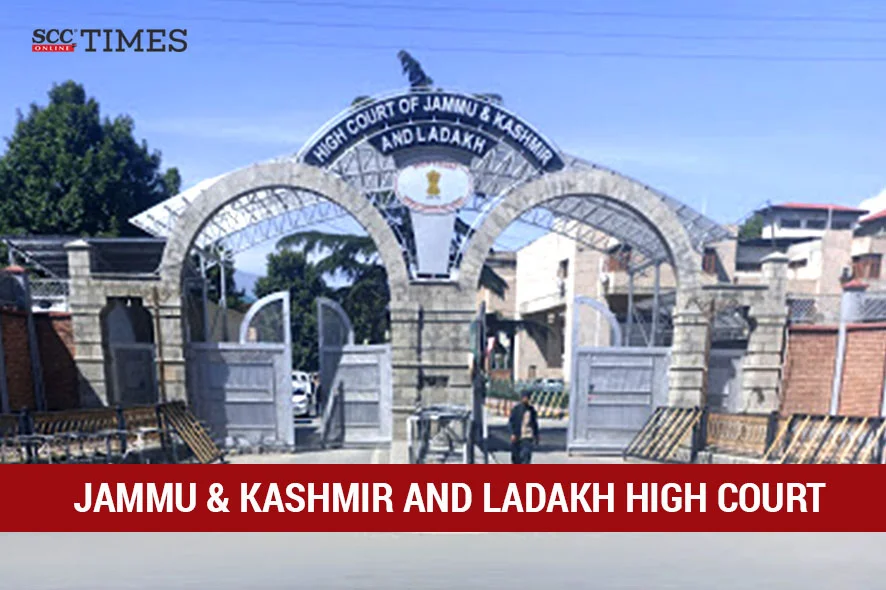Jammu & Kashmir and Ladakh High Court: In a petition challenging the order dated 25-03-2022 passed by the Judicial Magistrate 1st Class, Vailoo directing the registration of an FIR against the petitioners (Revenue Officers) under Sections 447, 354, and 506 IPC for forcibly entering into the ‘named Darul Arifa Hazrat Khadijatul Qubra’ trust premises, harassing female students and using threats., a single-judge bench of Sanjay Dhar, J., allowed the petition and quashed the Magistrate’s order, the FIR and all proceedings stemming from them as they suffered from procedural illegality and were motivated by malice against public officials acting under lawful directions.
Brief Facts
In the instant matter, the complainant-respondent 3 is associated with a trust named Darul Arifa Hazrat Khadijatul Qubra (RA), running a girls’ orphanage with hostel and mess facilities. The trust occupied both proprietary and adjacent state land under the erstwhile J&K State Lands (Vesting of Ownership to Occupants) Act (commonly referred to as the “ROSHNI Act”), which was later declared unconstitutional.
On 11-03-2022, officials led by petitioner 1 (Tehsildar, Kokernag) visited the trust premises to enforce eviction orders in compliance with the judgment in S.K. Bhalla v. State of J&K (PIL No.119/2011). The complaint alleged that the petitioners forcibly entered the trust premises, harassed female students, locked the kitchen and dining areas, and used threats.
Moot Points
-
Can Magistrate validly direct registration of FIR under Section 156(3) CrPC without compliance with Sections 154(1) and 154(3) CrPC?
-
Whether the FIR and criminal proceedings against the petitioners, a government official acting in pursuance of a court judgment, maintainable?
-
Can vague allegations unsupported by specific facts justify continuation of criminal proceedings?
Parties’ Contentions
The petitioners argued that the FIR was lodged to thwart legitimate eviction action initiated under court orders. The petitioners argued for non-compliance with Priyanka Shrivastava v. State of U.P., (2015) 6 SCC 287, where the Supreme Court mandated that applications under Section 156(3) CrPC be preceded by steps under Sections 154(1) and 154(3). It was contended that no offence is made out against the petitioners and the allegations were vague and made only to obstruct official duty.
However, the State submitted that pursuant to the Magistrate’s direction, investigation commenced, and statements and revenue documents were obtained. It was conceded that the land in question is state land, thus negating the offence under Section 447 IPC.
Court’s Observations
The Court emphasised on the binding nature of the Supreme Court’s ruling in Priyanka Shrivastava (Supra) and stated that Magistrates must verify compliance with procedural safeguards before issuing directions under Section 156(3) CrPC and “there has to be prior application under Section 154(1) and 154(3) CrPC while filing an application under section 156(3) Cr. P. C. and a complainant has to clearly spell out both these aspects in his application and necessary documents to that effect have to be filed.”
The Court noted that the complainant failed to demonstrate adherence to Sections 154(1) and 154(3) CrPC as there is no record of an attempt to lodge the complaint with the police before approaching the Magistrate. The Court found that the complainant has not mentioned any specific date or officer approached, nor had he filed any documentary proof of such an approach.
-
General Exceptions under IPC – Acts performed in discharge of official duty
Referring to Section 78 IPC and A.K. Chaudhary v. State of Gujarat, 2005 SCC OnLine Guj 353, the Court held that an act done in pursuance of judgment or order of a Court is not an offence and therefore, an act done by a person pursuant to the judgment of the Court cannot form basis for prosecuting such person.
The Court held that the petitioners, being revenue officials executing a judicial direction in S.K. Bhalla (Supra), acted under legal authority. The Court further held that “once it is clearly discernible from the allegations made in the complaint that the act of the accused falls within the General Exceptions, there is no need to wait for submission of proof on behalf of the accused so as to bring his case within the purview of General Exceptions.”
-
Vagueness of Allegations
The Court noted that allegations under Sections 354 and 506 IPC regarding outraging modesty and threats are vague and unspecified. The Court stated that “no particulars have been given in the complaint as to against whom such offences were committed by the petitioners… the petitioners cannot be subjected to prosecution.”
-
Abuse of Process and Malice
The Court observed that the “it appears that the complainant has, with a view to obstruct the petitioners from discharging their official functions… resorted to lodging of the impugned FIR so as to wreak vengeance upon them,” hence, continuation of proceedings would defeat the very objective of lawful governance.
Court’s Decision
The Court quashed the FIR and Magistrate’s order as they suffered from procedural illegality and were motivated by malice against public officials acting under lawful directions.
“The instant case is a fit one where this Court should exercise its power under Section 482 CrPC to quash the criminal proceedings… to prevent abuse of process of law and to secure the ends of justice.”
[Syed Muiz Qadri v. UT of J&K, 2025 SCC OnLine J&K 564, Decided on 06-06-2025]
Advocates who appeared in this case :
Mr. Salih Pirzada with Mr. Bhat Shafi, Counsel for the Petitioners
Mr. Faheem Nisar Shah, GA, Counsel for the Respondent




